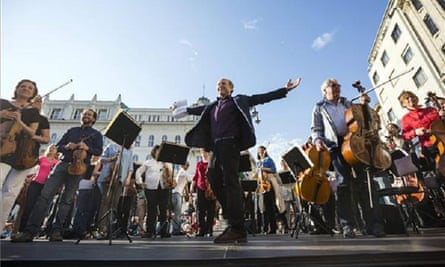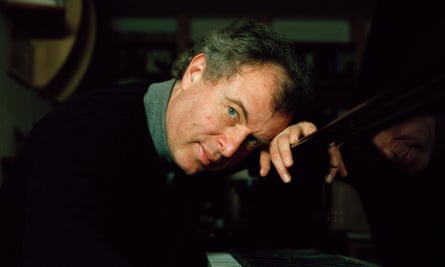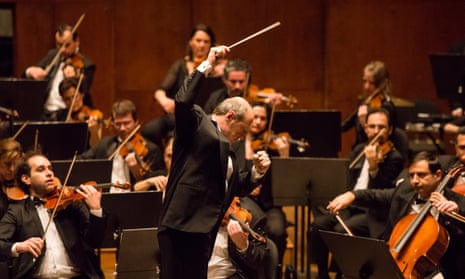Musicians dislike the C-word – “a career, no I never give that a thought,” they will protest – but in the great Hungarian conductor Iván Fischer’s case you suspect it is true. “I never consider mountain peaks to be reached,” he tells me in his soft, careful, accented English. “It has never been in my mind that I want to achieve certain things. If I achieved anything in terms of career, it was an accident.”
Fischer says he tries to avoid much of what being a high-profile conductor implies. “About 90% of what a conductor represents are things I don’t like. I just like a very small fraction of this profession, which is the music. The rest – the glamour, the power, the hierarchy, the routine of how to work with orchestras – is something I don’t feel comfortable with. I never had a feeling that this was what I wanted to do. I bear it because I have to, but it’s not something that attracts me. The last profession I would choose is conducting.”
We are meeting at Fischer’s large, quiet house in a suburb of south-west Berlin. As well as being founder and music director of the Budapest Festival Orchestra, Fischer is now also music director of the Konzerthaus in Berlin. He has had one or two run-ins with Hungary’s rightwing government recently, and living in Berlin with his wife and two sons gives him a bit of breathing space, though he remains utterly committed to his Budapest orchestra, which he will be bringing to the Proms on 26 August.
We are in a sitting room filled with Fischer’s scores. A Beethoven sonata is open on his piano; he likes to play whenever he can. Fischer keeps his jacket on throughout the interview – very Mitteleuropean, not grand in that old maestro-ish way but still quite formal. He is 65: getting on in life but less so in conducting. In the past decade he has returned to composition, writing eclectic works for voices and orchestra. He says he wishes he had made the decision to balance conducting and composing earlier in his career.
“I came back to composing very late,” he explains. “Conducting sucked me in. I won a conducting competition when I was 25 [the Rupert Foundation competition in London in 1976], and there were offers, offers, offers. Of course it felt like an attractive thing, because I thought: ‘Maybe the next concert will be very enjoyable.’ But even then as a 25-year-old I was purely interested in the music, and not the profession itself. The role of imagining and developing a piece and training a group is attractive, but not putting on tails and going out there.”
Fischer does very little guest conducting these days, though he has maintained his relationships with Amsterdam’s Royal Concertgebouw Orchestra and the Berlin Philharmonic. He only wants to work with great orchestras, I suggest, but he questions the term “great” and the assumption that conductors will want to cultivate them. “People assume that conductors love to wave their hands in front of great orchestras. I don’t belong to that club. The so-called great orchestras – the old, great orchestras – like to preserve certain musical values such as their sound. They think: ‘This is us, this is our trademark.’ Now a conductor comes and he has limited influence on the so-called great orchestra. So they attract conductors who love to wave their hands while not changing anything. Sometimes when you go to famous orchestras, you feel as if you are working with a prima donna singer who has her sound, and your only role is to be impressed by it. I would much rather go to an orchestra that is receptive to my ideas because I can then create something.”

So why carry on with, say, the Berlin Phil? “I’ve known them for over 20 years now. I know individually each one of them, they’re wonderful musicians. I’ve figured out a way to work with them, but it has its limitations. You would never want to do it long term.”
Better to work with your own orchestra, and that is what he has done with the Budapest Festival Orchestra, which he co-founded with fellow Hungarian conductor Zoltán Kocsis in 1983. “I believe in long-term work,” says Fischer. “It’s like a psychoanalysis that lasts a few years compared with a one-time consultation with a patient. After 30 years something serious starts. We know each other inside out; we trust each other; there is a complete confidence.”
What Fischer wants to avoid above all is a sense of routine. “We work with intensity and in a very personal way. It is more like the way a string quartet works. I don’t say to the principal cellist: ‘Please a little softer.’ I would say: ‘Come on Peter, what the hell are you doing?’ It’s a different communication, much more personal. I immediately notice when their level of focus or concentration is not what it should be. I work much more like a theatre director would work with actors.” The fact that the great majority of the musicians in the orchestra are Hungarian and have emerged from the country’s vibrant musical tradition adds to their sense of commonality of purpose.
The Budapest Festival Orchestra is Hungary’s greatest cultural export, but had its grant from the city council slashed recently, a move that was interpreted as punishment for Fischer’s criticism of the country’s authoritarian and nationalistic government. The €640,000 budget cut meant a reduction in the orchestra’s outreach programme, which had sought to take music into schools and nursing homes. “Iván Fischer is beginning to lose his self-control,” said Budapest’s mayor, István Tarlós, when the orchestra dared to protest about the budget cut.
“We get most of our subsidy from the state,” says Fischer, “and that is unaffected. I am very pleased that the government has maintained that support, which is worth about €4m. They understand the value of the orchestra to Hungary. What is interesting is the difference between the government and the city. One politician understands the value; another one doesn’t.”
Fischer says the city never explained the reason for the sudden reduction in subsidy in the middle of the orchestra’s season. “Everybody can cut subsidies, it’s their right to do that, but we also have the right to protest. We arranged a big public demonstration, and many people came into the streets of Budapest. It was a fantastic wave of sympathy, and we hope the mayor will change his mind because this is not the policy of the Hungarian government.”
Though Fischer dislikes the reactionary nature of Viktor Orbán’s government and the growth of antisemitism in the country, he nevertheless feels he can do business with them. Unlike pianist András Schiff, who has vowed not to return to his native Hungary in the current illiberal climate, Fischer is trying to work for change from within. “It’s a country where you can argue, discuss, raise your voice, have differences of opinion, and I will keep criticising things which I disagree with.”
Fischer is Jewish, and his political views are refracted through his family experience. His grandmother was killed in Auschwitz; his grandfather was beaten to death in Buchenwald; his parents had to hide out in Budapest for the duration of the war. “Do we really want to go back to this nationalist past, where nations turned against each other and religions turned against each other?” he asks. “This is the history of Europe, and the reason I believe in the integration of Europe, so that finally we become a family of nations who have peace with each other. That is more important than anything else.” Music, he believes, can help bring that dream about.

Photograph: Karen Robinson/The Observer
Despite the challenges of Hungary’s “illiberal democracy” (Orbán’s chilling phrase) and the fact Fischer prefers Berlin as a tolerant place in which to bring up his children and where he enjoys his job in the city, he anticipates working with his Budapest orchestra for the rest of his life. The orchestra he founded is his lifelong passion; he also sees it as a “laboratory” for orchestras of the future, offering flexibility, openness and a group of players that he encourages to develop as portfolio musicians rather than spending their lives as fixtures with the orchestra.
“If you are a member of the Budapest Festival Orchestra, the great thing is that you are allowed a much more versatile musician’s life,” he explains. He wants “individualists” rather than “obedient, uniform soldiers”. “For the future of music, it is better to develop the symphony orchestra as a more flexible organisation that can embrace other musical styles. Now, we have a symphony orchestra that looks more or less like the one in Richard Strauss’s time. It’s already 100 years old. I don’t really think it will stay the same 100 years from now. The idea of a symphony orchestra must develop over time or it will become a museum.”
He wants his ensemble to be able to play everything. “The conventional symphony orchestra leaves baroque repertoire to the period instrument orchestras and contemporary music to the specialised groups,” he says. “Because we encourage the individual interests of musicians, we have a period instrument part of the orchestra, we have a chorus, we have a group playing Transylvanian folk music, another group working on jazz improvisations.”
The aim is to keep both musicians and audience on their toes. He is known for his innovations: concerts where the audience chooses the pieces, which means they are played without rehearsal; encores in which the orchestra abandon their instruments and sing instead; operas where he does the staging himself (admittedly with mixed results). Every convention must be challenged.
The Prom, which will include three pieces written in the final year of Mozart’s life, showcases Fischer’s love of innovation. For the Requiem, he prefers to seat musicians and singers together. “When I mix the singers with the instrumentalists, the instrumentalists are much more aware of the text,” he explains. “They don’t see it as notes, but as doubling of a vocal line. That produces a unity of playing and singing which for me is essential.”
His close identification with the Budapest Festival Orchestra raises the tricky issue of what happens when he is no longer there. “It’s always difficult if there is a founder conductor who has completely made an orchestra according to a personal vision,” he admits. “If I go, somebody would need to take over, but I would hope that person will change it completely.” He says it would be unwise for him to have a hand in choosing a successor. “If I identify him or her, then I want to clone myself.”
For the moment he appreciates the irony that the orchestra he created because he was dissatisfied with “great” orchestras is now itself seen as one of the world’s finest. “I was very pleased that we could break into this old club,” he says of Gramophone magazine placing them in the global top 10. “We are the newcomers on the list, and it’s unbelievable how successful it has become in 30 years. But I hope we are not like the famous old names, because we must stay experimenting and ever-changing.” Always a laboratory; never a museum.

Comments (…)
Sign in or create your Guardian account to join the discussion